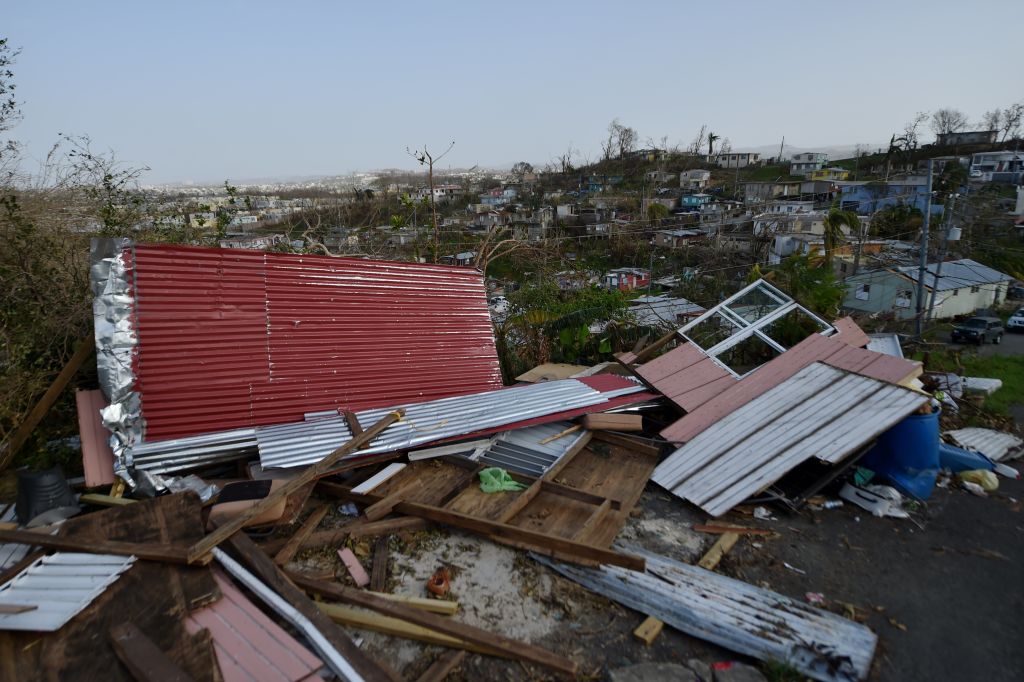Suspending this 1920 law might help Puerto Rico recover faster. So far, Trump says no.


A free daily email with the biggest news stories of the day – and the best features from TheWeek.com
You are now subscribed
Your newsletter sign-up was successful
Hurricane Maria left Puerto Rico in ruins. About half the island's 3.4 million residents are without potable water, food and fuel are scarce, hospitals are struggling, and most of the island is without electricity. The devastation "is so broad, and the relief effort so concentrated in San Juan, that many people from outside the capital say they have received little to no help," The Associated Press reports.
"It is hard to avoid the fact that the response looks different than previous ones," AP says. After Hurricane Harvey in Texas and Hurricane Irma in Florida, the Trump administration suspended the Jones Act, a 1920 law limiting shipping between U.S. ports to U.S.-flagged vessels. On Tuesday, the Homeland Security Department said it wouldn't suspend the Jones Act for Puerto Rico. Sen. John McCain (R-Ariz.) criticized that decision. "It is unacceptable to force the people of Puerto Rico to pay at least twice as much for food, clean drinking water, supplies, and infrastructure due to Jones Act requirements as they work to recover from this disaster," he said. Nelson Denis, a former New York State assemblyman, elaborated in The New York Times:
Under the law, any foreign registry vessel that enters Puerto Rico must pay punitive tariffs, fees, and taxes, which are passed on to the Puerto Rican consumer. ... A 2012 report by two University of Puerto Rico economists found that the Jones Act caused a $17 billion loss to the island's economy from 1990 through 2010. Other studies have estimated the Jones Act's damage to Puerto Rico, Hawaii and Alaska to be $2.8 billion to $9.8 billion per year. According to all these reports, if the Jones Act did not exist, then neither would the public debt of Puerto Rico. [Denis in The New York Times]
You can read his entire argument at The New York Times.
The Week
Escape your echo chamber. Get the facts behind the news, plus analysis from multiple perspectives.

Sign up for The Week's Free Newsletters
From our morning news briefing to a weekly Good News Newsletter, get the best of The Week delivered directly to your inbox.
From our morning news briefing to a weekly Good News Newsletter, get the best of The Week delivered directly to your inbox.
A free daily email with the biggest news stories of the day – and the best features from TheWeek.com
Peter has worked as a news and culture writer and editor at The Week since the site's launch in 2008. He covers politics, world affairs, religion and cultural currents. His journalism career began as a copy editor at a financial newswire and has included editorial positions at The New York Times Magazine, Facts on File, and Oregon State University.
-
 How the FCC’s ‘equal time’ rule works
How the FCC’s ‘equal time’ rule worksIn the Spotlight The law is at the heart of the Colbert-CBS conflict
-
 What is the endgame in the DHS shutdown?
What is the endgame in the DHS shutdown?Today’s Big Question Democrats want to rein in ICE’s immigration crackdown
-
 ‘Poor time management isn’t just an inconvenience’
‘Poor time management isn’t just an inconvenience’Instant Opinion Opinion, comment and editorials of the day
-
 TikTok secures deal to remain in US
TikTok secures deal to remain in USSpeed Read ByteDance will form a US version of the popular video-sharing platform
-
 Unemployment rate ticks up amid fall job losses
Unemployment rate ticks up amid fall job lossesSpeed Read Data released by the Commerce Department indicates ‘one of the weakest American labor markets in years’
-
 US mints final penny after 232-year run
US mints final penny after 232-year runSpeed Read Production of the one-cent coin has ended
-
 Warner Bros. explores sale amid Paramount bids
Warner Bros. explores sale amid Paramount bidsSpeed Read The media giant, home to HBO and DC Studios, has received interest from multiple buying parties
-
 Gold tops $4K per ounce, signaling financial unease
Gold tops $4K per ounce, signaling financial uneaseSpeed Read Investors are worried about President Donald Trump’s trade war
-
 Electronic Arts to go private in record $55B deal
Electronic Arts to go private in record $55B dealspeed read The video game giant is behind ‘The Sims’ and ‘Madden NFL’
-
 New York court tosses Trump's $500M fraud fine
New York court tosses Trump's $500M fraud fineSpeed Read A divided appeals court threw out a hefty penalty against President Trump for fraudulently inflating his wealth
-
 Trump said to seek government stake in Intel
Trump said to seek government stake in IntelSpeed Read The president and Intel CEO Lip-Bu Tan reportedly discussed the proposal at a recent meeting
